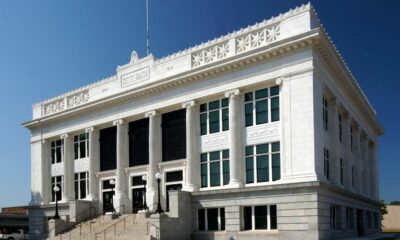Mississippi Today
An increasing number of Mississippians are being hospitalized for COVID-19, data shows

Coronavirus cases appear to be rising in Mississippi again.
There were 121 hospital admissions for COVID-19 in the state during the week ending on Aug. 12, according to data from the Centers for Disease Control and Prevention. That's a 21% increase from the previous week.
That same week,1,413 Mississippians reported coronavirus-like illnesses, according to the state Health Department.
The number of COVID-19-like illness visits has been on the rise since June. August is the first time the number has gone over 1,000 since March, and it hasn't been this high since late January.
While the state Health Department no longer reports daily coronavirus cases, the agency uses syndromic surveillance, or the number of COVID-19-like illness visits at hospitals and urgent care clinics throughout the state, to track coronavirus prevalence. The chart is typically updated every Friday.
Interim State Epidemiologist Dr. Kathryn Taylor said the increase is likely related to school and colleges starting classes again, in addition to the record high temperatures forcing people indoors more often.
Other nearby Southern states, including Tennessee and Louisiana, are seeing similar increases in recent COVID-19 hospitalization.
Taylor said an increasing number of coronavirus hospitalizations could put further burden on Mississippi's health care system, which was financially decimated by the pandemic. The state agency is monitoring hospital and ICU capacity.
She said Mississippians should remain vigilant against COVID-19 and protect themselves and their families.
The state health department's overall recommendations safeguarding against coronavirus have not changed: Stay up to date on COVID-19 vaccines, practice good hand hygiene, stay home if sick and get tested as needed. People at higher risk of severe outcomes might consider wearing a mask in public spaces, Taylor added.
“Mississippians should continue to be aware that COVID-19 is a concern,” she said.
COVID-19 vaccinations and testing continue to be available at the county health departments, according to Taylor.
This article first appeared on Mississippi Today and is republished here under a Creative Commons license.
Mississippi Today
On this day in 1983


May 6, 1983

A federal judge sentenced Raymond Bledsoe to life for beating Black jazz saxophonist Steven Harvey to death in a Kansas City park because of his race.
A Missouri jury had acquitted Bledsoe of murder, and afterward, he reportedly bragged to his girlfriend about killing a “n—–” and getting away with it.
Harvey's family members, Alvin Sykes and the Steve Harvey Justice Campaign convinced federal authorities to pursue the case. At the time, the conviction was reportedly the fourth under the Civil Rights Act of 1968.
In 2013, federal corrections authorities denied parole to Bledsoe. To date, he remains the longest serving inmate convicted under that Civil Rights Act.
Sykes later helped bring about both the Justice Department's reopening of the Emmett Till case and the passage of the Emmett Till Unsolved Civil Rights Crime Act.
Sykes died in 2021, and his New York Times obituary read, “Though he never took a bar exam, Mr. Sykes was a brilliant legal and legislative operator whose admirers included City Council members, politicians and U.S. attorneys general from both parties. … He led a monk's life in the name of social justice. He rarely held a job, wore second hand clothing and lacked a permanent address for long stretches of time, staying with friends instead and living off donations and, later, speaker fees. He never learned to drive and so walked everywhere, most often to the reference section of the library in Kansas City, Missouri, where he did his research, or to a booth at a restaurant that he used as an informal office, his papers surrounded by cups of coffee and stubbed-out cigarettes.”
This article first appeared on Mississippi Today and is republished here under a Creative Commons license.
Mississippi Today
Podcast: How the 2024 Medicaid expansion debate died

Mississippi Today's Adam Ganucheau, Bobby Harrison, Geoff Pender, and Taylor Vance discuss the breakdown of Medicaid expansion negotiations in the Legislature.
This article first appeared on Mississippi Today and is republished here under a Creative Commons license.
Did you miss our previous article…
https://www.biloxinewsevents.com/?p=355689
Mississippi Today
On this day in 1917
May 5, 1917

Eugene Jacques Bullard became the first Black American combat pilot.
After the near lynching of his father and hearing that Great Britain lacked such racism, the 12-year-old Georgia native stowed away on a ship headed for Scotland. From there, he moved to Liverpool, England, where he handled odd jobs before becoming a boxer, traveling across Europe before he settled in Paris.
“It seems to me that the French democracy influenced the minds of both White and Black Americans there and helped us all to act like brothers as near as possible,” he said. “It convinced me, too, that God really did create all men equal, and it was easy to live that way.”
When World War I began, he was too young to fight for his adopted country, so he and other American expatriates joined the French Foreign Legion. Through a series of battles, he was wounded, and doctors believed he would never walk again.
No longer able to serve in the infantry, an American friend bet him $2,000 that he could not get into aviation. Taking on the challenge, he earned his “wings” and began fighting for the French Aéronautique Militaire.
He addressed racism with words on his plane, “All Blood Runs Red,” and he nicknamed himself, “The Black Swallow of Death.”
On his flights, he reportedly took along a Rhesus monkey named “Jimmy.” He tried to join the U.S. Air Service, only to be turned away because he was Black. He became one of France's most decorated war heroes, earning the French Legion of Honor.
After the war he bought a Paris nightclub, where Josephine Baker and Louis Armstrong performed and eventually helped French officials ferret out Nazi sympathizers. After World War II ended, he moved to Harlem, but his widespread fame never followed him back to the U.S.
In 1960, when French President Charles de Gaulle visited, he told government officials that he wanted to see his old friend, Bullard. No one in the government knew where Bullard was, and the FBI finally found him in an unexpected place — working as an elevator operator at the Rockefeller Center in New York City.
After de Gaulle's visit, he appeared on “The Today Show,” which was shot in the same building where he worked.
Upon his death from cancer in 1961, he was buried with honors in the French War Veterans' section of the Flushing Cemetery in Queens, New York.
A sculpture of Bullard can be viewed in the Smithsonian National Space and Air Museum in Washington, D.C., a statue of him can be found outside the Museum of Aviation, and an exhibit on him can be seen inside the National Museum of the U.S. Air Force, which posthumously gave him the rank of a second lieutenant. He is loosely portrayed in the 2006 film, “Flyboys.”
This article first appeared on Mississippi Today and is republished here under a Creative Commons license.
-
SuperTalk FM4 days ago
Driver’s education set to become mandatory in Mississippi as bill passes
-
SuperTalk FM7 days ago
Festival merger in Leland sets up one major event for Mississippi Delta
-
SuperTalk FM3 days ago
State approves $160M to expand Highway 7 to four lanes in Lafayette County
-
Mississippi Business5 days ago
Geartek expanding operations in Alcorn County
-
Mississippi News6 days ago
Two women accused of shoplifting across southeast captured in Mississippi
-
Mississippi News4 days ago
Altercation at Mississippi police department leads to officer-involved shooting
-
Mississippi News6 days ago
Starkville police make arrest in shooting at Dawg Wash South
-
Mississippi News16 hours ago
Winston Co. Sheriff’s Office investigates shooting at Dave’s Club







































